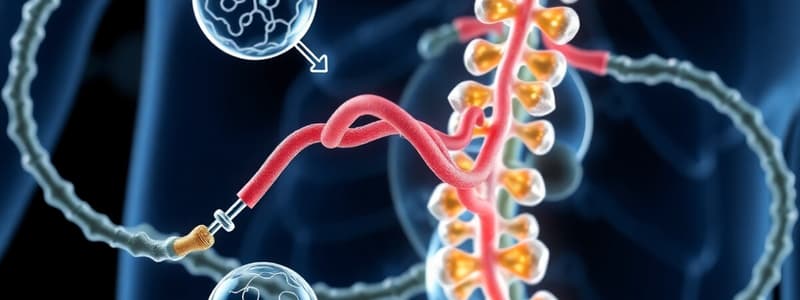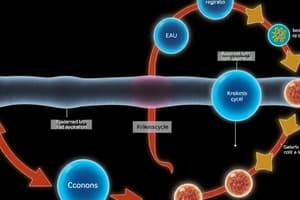Podcast
Questions and Answers
Which of the following is NOT a primary function of enzymes involved in glycolysis?
Which of the following is NOT a primary function of enzymes involved in glycolysis?
- Catalyzing the phosphorylation of glucose.
- Isomerization of glucose-6-phosphate to fructose-6-phosphate.
- Directly producing $FADH_2$ during substrate conversion. (correct)
- Cleaving fructose-1,6-bisphosphate into two three-carbon molecules.
In eukaryotic cells, which cellular compartment is NOT directly involved in carbohydrate metabolism?
In eukaryotic cells, which cellular compartment is NOT directly involved in carbohydrate metabolism?
- Mitochondrial matrix
- Intermembrane space of mitochondria
- Cytosol
- Endoplasmic Reticulum (correct)
A yeast cell undergoing fermentation experiences a build-up of NADH. Which metabolic strategy is essential for the continuation of glycolysis under these anaerobic conditions?
A yeast cell undergoing fermentation experiences a build-up of NADH. Which metabolic strategy is essential for the continuation of glycolysis under these anaerobic conditions?
- Oxidizing NADH by reducing pyruvate to lactate.
- Increasing the activity of the pentose phosphate pathway to consume excess NADH.
- Shuttling NADH into the mitochondria for oxidation via the electron transport chain.
- Oxidizing NADH by reducing acetaldehyde to ethanol. (correct)
During the initial phase of glycolysis, a key regulatory step involves the enzyme phosphofructokinase-1 (PFK-1). Which of the following scenarios would MOST effectively stimulate PFK-1 activity?
During the initial phase of glycolysis, a key regulatory step involves the enzyme phosphofructokinase-1 (PFK-1). Which of the following scenarios would MOST effectively stimulate PFK-1 activity?
Which of the following enzymatic reactions serves as a critical link between glycolysis and the Krebs cycle?
Which of the following enzymatic reactions serves as a critical link between glycolysis and the Krebs cycle?
How many molecules of $CO_2$ are produced from each molecule of glucose that enters glycolysis, is converted to acetyl-CoA, and proceeds through the Krebs cycle?
How many molecules of $CO_2$ are produced from each molecule of glucose that enters glycolysis, is converted to acetyl-CoA, and proceeds through the Krebs cycle?
Which statement accurately distinguishes between oxidation and reduction reactions in biological systems?
Which statement accurately distinguishes between oxidation and reduction reactions in biological systems?
Which of the following is the MOST accurate and complete summary of the net products of glycolysis per molecule of glucose?
Which of the following is the MOST accurate and complete summary of the net products of glycolysis per molecule of glucose?
Which of the following molecules is NOT directly involved in either glycolysis, the Krebs cycle, or the electron transport chain?
Which of the following molecules is NOT directly involved in either glycolysis, the Krebs cycle, or the electron transport chain?
How many turns of the Krebs cycle are required to completely oxidize one molecule of glucose that has been processed through glycolysis?
How many turns of the Krebs cycle are required to completely oxidize one molecule of glucose that has been processed through glycolysis?
Which of the following Krebs cycle intermediates directly participates in substrate-level phosphorylation?
Which of the following Krebs cycle intermediates directly participates in substrate-level phosphorylation?
In what specific order do the following processes occur during cellular respiration: (1) electron transport chain, (2) glycolysis, (3) Krebs cycle, (4) oxidative phosphorylation?
In what specific order do the following processes occur during cellular respiration: (1) electron transport chain, (2) glycolysis, (3) Krebs cycle, (4) oxidative phosphorylation?
What is the critical molecule that directly links glycolysis to the Krebs cycle?
What is the critical molecule that directly links glycolysis to the Krebs cycle?
Which of the following molecules is essential for the electron transport chain?
Which of the following molecules is essential for the electron transport chain?
What is the primary function of the electron transport chain complexes?
What is the primary function of the electron transport chain complexes?
During oxidative phosphorylation, what is the direct role of the proton gradient established across the inner mitochondrial membrane?
During oxidative phosphorylation, what is the direct role of the proton gradient established across the inner mitochondrial membrane?
Under anaerobic conditions, which of the following represents the NET ATP production from one molecule of glucose in glycolysis, the Krebs cycle, and the electron transport chain combined?
Under anaerobic conditions, which of the following represents the NET ATP production from one molecule of glucose in glycolysis, the Krebs cycle, and the electron transport chain combined?
Which of the following molecules directly supplies electrons for carbon fixation reactions in photosynthesis?
Which of the following molecules directly supplies electrons for carbon fixation reactions in photosynthesis?
Which of the following is NOT a critical function of carbohydrate metabolic pathways?
Which of the following is NOT a critical function of carbohydrate metabolic pathways?
Which clinical scenario is NOT typically associated with mitochondrial respiratory chain dysfunction?
Which clinical scenario is NOT typically associated with mitochondrial respiratory chain dysfunction?
Flashcards
Glycolysis Enzymes
Glycolysis Enzymes
Enzymes that play a key role in glycolysis and the specific reactions they catalyze.
Cellular Compartments
Cellular Compartments
Specific areas within cells where carbohydrate metabolism processes occur.
Fermentation
Fermentation
An anaerobic process that breaks down glucose without oxygen.
Glycolysis Phases
Glycolysis Phases
Signup and view all the flashcards
Glycolysis-Krebs Bridge
Glycolysis-Krebs Bridge
Signup and view all the flashcards
Metabolic Products
Metabolic Products
Signup and view all the flashcards
Oxidation vs. Reduction
Oxidation vs. Reduction
Signup and view all the flashcards
Glycolysis Overview
Glycolysis Overview
Signup and view all the flashcards
Key Metabolic Molecules
Key Metabolic Molecules
Signup and view all the flashcards
Krebs Cycle
Krebs Cycle
Signup and view all the flashcards
Krebs Acids
Krebs Acids
Signup and view all the flashcards
Respiration Stages
Respiration Stages
Signup and view all the flashcards
Glycolysis-Krebs Link
Glycolysis-Krebs Link
Signup and view all the flashcards
ETC Molecules
ETC Molecules
Signup and view all the flashcards
ETC Complexes
ETC Complexes
Signup and view all the flashcards
Proton Translocation
Proton Translocation
Signup and view all the flashcards
ATP Production
ATP Production
Signup and view all the flashcards
Carbohydrate Molecules
Carbohydrate Molecules
Signup and view all the flashcards
Identifying Sugars
Identifying Sugars
Signup and view all the flashcards
Amino Acids
Amino Acids
Signup and view all the flashcards
Study Notes
- Exam: Bioquímica - CHEM 4220 – Examen Parcial II
- Professor: Harry Alices-Villanueva, Ph.D.
- Student: Byan Soto Vege
- Date: March 24, 2025
- ID: R00585929
Multiple Choice (80%) Topics - Main Enzymes & Processes
- Main enzymes in glycolysis and their reactions are a key topic
- Cellular compartments where carbohydrate metabolism occurs must be understood
- Fermentation is a process to study
- Important reactions in the first and second phases of glycolysis are key
Glycolysis and Krebs Cycle
- Focus on the link between the first and second phases of glycolysis
- Products of glycolysis, the Krebs cycle, and the respiratory chain are exam topics
- Understanding oxidation and reduction is needed
- General understanding of the glycolysis process is expected
Molecules and Cellular Respiration
- Focus is on important molecules in glycolysis, Krebs cycle & respiratory chain
- Revolutions of the Krebs cycle need to be known
- Important acids in Krebs must be known
- Sequential order of different stages during cellular respiration is key
Molecular Bridges and Function
- A bridge between glycolysis and the Krebs cycle is important
- Molecules important in the respiratory chain are a topic
- Focus on the function of complexes in the respiratory chain
- Translocation of protons in the respiratory chain is a topic
ATP Production & Metabolic Processes
- ATP molecules produced in glycolysis, Krebs cycle, & respiratory chain are key
- General reactions of photosynthesis and cellular respiration are topics
- Important molecules needed for carbohydrate metabolic processes are tested areas
- Clinical situations related to the respiratory chain are topics
Identifying Carbohydrates
- Identify monosaccharides, disaccharides, and/or polysaccharides among various carbohydrates
- Classify CHO's based on functional groups and C number
- Formation of hemicetals and hemiacetals are topics
Amino Acids
- Amino acid structures are part of the test
- Essential amino acids knowledge is required
Studying That Suits You
Use AI to generate personalized quizzes and flashcards to suit your learning preferences.



